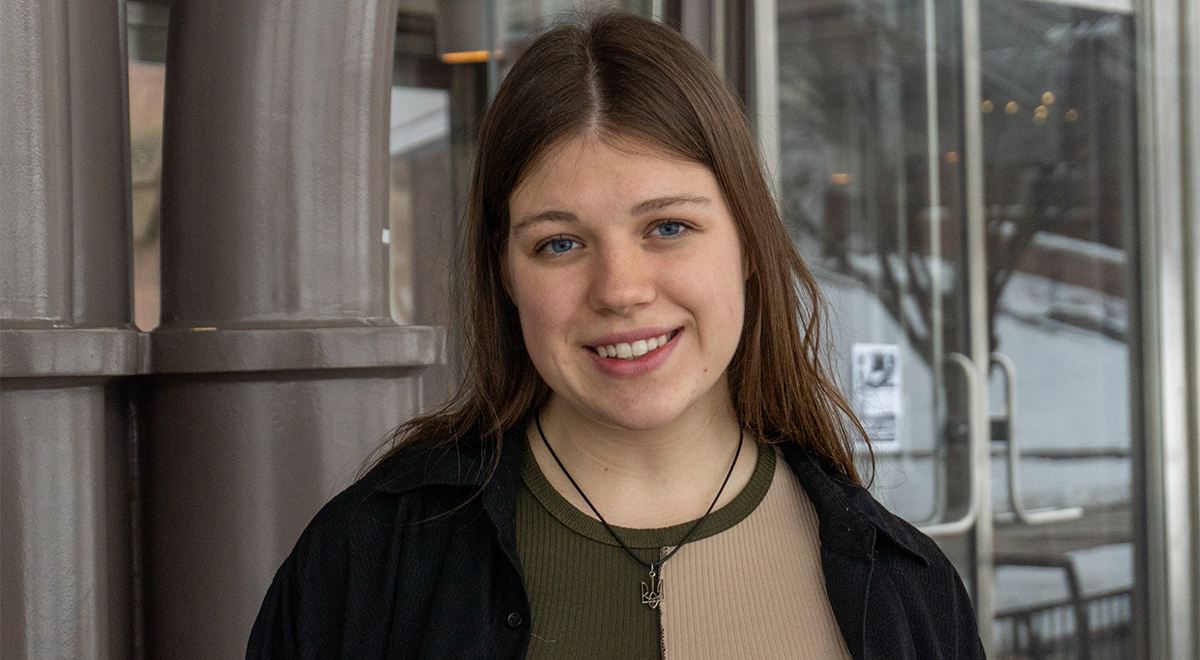Ukrainian Student Shares Stories of Survival

By: Rose Chen ’26
In the summer of 2024, Oleksandra Volakova ’27 received a Wesleyan Summer Grant to travel to Poland, where she documented the impacts of the Russian invasion of Ukraine and interviewed refugees from the war. She then returned to her hometown of Kremenchuk in eastern Ukraine, and decided to continue the project by travelling around the country and hearing from other survivors throughout the region.
On Feb. 5, Volakova shared her research “Three Years of Full-Scale War: How Ukrainians Continue to Resist and Stay Hopeful” during a talk at the Wasch Center for Retired Faculty.
“As a Ukrainian myself, I feel like what I know about Ukraine is not known here—through all the media, through all the news, there are a lot of statistics, and not much about real people,” Volakova said. “I just felt that it would be really nice just to show people just as they are, and to help people, especially here in America, understand who Ukrainians are, what they do, how they endure through the war, and how they just continue to exist.”
During her talk, Volakova shared the experiences of three Ukrainians affected by the war. She began with the story of Vitali, who was a military volunteer from the beginning of the full-scale war. On March 2, 2022, Vitali woke up to missile strikes from the Russian forces. When he ran to help, he was injured by a second incoming strike.
“Because of the adrenaline, he was able to stand up and run to his friends, and that’s when he collapsed and couldn’t move anymore,” Volakova said. “He was talking [to me] about a lot of his friends who died on the battlefields or who died from the airstrikes in Kharkiv. I said that it’s okay for him to not talk about that, because it’s a very sensitive topic, and I don’t want to make him live through those emotions again. But he said something that struck me, that as long as we speak about them, we remember them. A person is alive in this world as long as memory about them is alive.”
While he can no longer serve in the army due to his injury, Vitali now volunteers and is working on an explosive drone project to continue to defend his hometown.
Volakova also recounted the stories of Julia, a refugee from Melitopol, who escaped through Russia to Poland and recounted the stories of her neighbors. She also shared the story of Iryna, a kindergarten teacher from Zakarpattia who moved to Zaporizhzhya to be with her injured husband.
Volakova previously organized the “Unissued Diplomas” exhibit at Olin Library in Spring 2024. The exhibit honored the memory of 40 Ukrainian students who were unable to graduate because their lives were taken by the Russian invasion. This current project brought Volakova in contact with approximately 30 people, both in organized settings such as a refugee center in Poland, as well as spontaneous meetings during her travels throughout Ukraine.
“At first, I thought [the project] would be a collection of articles or maybe something similar to a book,” Volakova said. “But I saw how powerful performance is when I learned that several years ago, a student from Ukraine, also at Wesleyan, did a performance of monologues, telling stories of Ukrainians who were there during the Chernobyl catastrophe. I saw that this would be much more powerful than just text.”
Volakova hopes to capture the resilience, hope, and determination of her fellow Ukrainians, and their efforts to resist and rebuild. Although she does not know what the final form of this project will be, she is excited to have the opportunity to experiment and grow throughout the rest of her time at Wesleyan.
“The super-supportive culture at Wesleyan has helped me a lot,” Volakova said. “It makes me understand that something that I do will actually be accepted, especially at Wesleyan. And it can be a great point to start, because if I want to continue working towards advocating for Ukraine, Wesleyan gives this safe space where I can improve and be more prepared for real life.”
She also encouraged attendees to continue to volunteer and aid Ukrainian refugees around Wesleyan and to continue to learn more about the war and its impacts.
“This project made me feel that even though people’s stories are different, we are still moving towards the same goal,” Volakova said.

